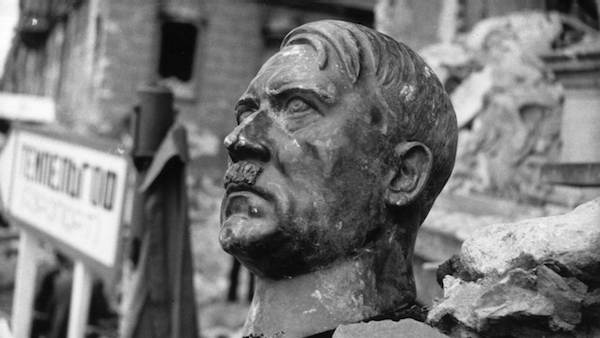Movie review by Greg Carlson
Filmmakers Petra Epperlein and Michael Tucker step gingerly into the minefield of serious media considerations of the infamous dictator with their new documentary “The Meaning of Hitler,” a Doc NYC world premiere available to stream through November 29. Acutely aware of the likelihood that they might be “contributing to the Nazi cinematic universe,” the married directors use the film to draw comparisons to contemporary nationalism, populism, and authoritarianism while revisiting many of the biographical markers of Hitler’s rise and fall. Using the 1978 book of the same title by Sebastian Haffner (the pen name of journalist Raimund Pretzel), Epperlein and Tucker enlist a variety of on-camera guests to map out a reminder and a warning.
Even as Donald Trump sulks and broods — and lies — about his loss in the national election, “The Meaning of Hitler” alludes to certain parallels between the two men. Savvy use of mass media tools to amplify propaganda may be more frustrating today, given the proliferation of troll farms and disinformation campaigns, but Hitler’s discovery of his gift for public oratory got an electronic assist from the Neumann CMV3 — a cylindrical microphone that acquired the nickname the “Hitler Bottle.” Sequences like this one, in which Epperlein and Tucker illustrate the seductive ability of the popular device to translate emotion by intercutting footage of the Beatles’ performance at Shea Stadium, keep viewers off balance.
And pairing vision with sound, the filmmakers use the hidden-in-plain-sight influences of Leni Riefestahl on Hollywood to address some of the most seductive designs favored by Hitler in the construction of his image. It is certainly not the first time that side by side comparisons have linked the medal ceremony that ends “Star Wars” with the symmetry in uniform carefully arranged at the 1934 Nuremberg Rally in “Triumph of the Will.” “The Lion King” also pops up, as well as a series of clips that — expectedly — checks off “The Producers.” Sarah Silverman’s interview with Conan O’Brien, in which she appears in full Hitler costume, is a newer entry in the comic renditions of Hitler.
In the end, “The Meaning of Hitler” lands somewhere between an exploration of Hitler as phenomenon and Hitler as person. Unfortunately, some of the movie’s most intriguing scenes veer from their intended goal. A visit to examine a Hitler-painted watercolor is introduced by the famous “Citizen Kane”-inspired tribute at the end of “Raiders of the Lost Ark.” The filmmakers do not ask the question of whether these artworks should continue to be protected. Much more effective is a montage of dramatized scenes of Hitler’s suicide, accompanied by a compelling argument that almost all of those movies bestow upon him a kind of dignity not afforded to his victims.
I am not sure whether giving ghoulish Holocaust denier David Irving so much screen time helps or hurts the efforts to shine light. Thankfully, Deborah Lipstadt, the victor in Irving’s notorious libel suit, also appears in the film. Novelist and writer Martin Amis is a droll addition to the lineup of talking heads, unleashing several acidic barbs when Trump is mentioned. But historian Saul Friedlander, now in his late 80s, is the movie’s most eloquent observer. Friedlander clearly gets what Epperlein and Tucker have set out to do, and never fails to offer poignant and reasoned thoughts on Hitler’s durable popularity.
